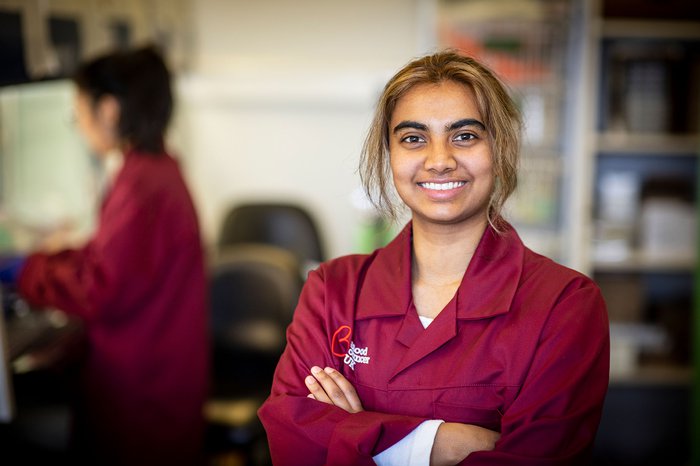We’re delighted to be funding 16 new research projects
We are delighted to announce funding for 16 new research projects across the UK, worth over £4million. The projects span all types of blood cancer and bring our total funding portfolio to 74 different research projects across 23 different institutions in the UK.

A researcher funded by Blood Cancer UK in the lab
Our new research projects span all types of blood cancer – leukaemia, lymphoma and myeloma – and you can learn more about each below.
16 new research projects:
Dr Jasmeen Oberoi from the University of Sussex wants to understand more about the role of a protein called BCR-ABL in people with chronic myeloid leukaemia (CML) to see if she can find new ways to treat the disease.
Dr Neil Rodrigues from Cardiff University is looking for new ways to treat acute myeloid leukaemia (AML). He is going to see whether increasing the level of a molecule in blood cells can restore normal function of blood cells in people with the disease.
Professor Guido Franzoso from Imperial College London is looking at which people with diffuse large B-cell lymphoma (DLBCL) might benefit from a new treatment that targets cancer cells specifically and leaves healthy cells unharmed.
Dr Daniel Royston from the University of Oxford will use new technology to look for new ways to diagnose myeloproliferative neoplasms (MPNs), making it quicker and easier to diagnose the disease.
Professor Andrew Pettitt from the University of Liverpool will study data on 700,000 people affected by blood cancer to answer outstanding questions such as how well treatments are working and what order of treatment we should give to people.
Dr Sarra Ryan from Newcastle University is developing a new computerised technique to identify alterations in the DNA of blood cells that cause acute lymphoblastic leukaemia (ALL) in children.
Professor Anastasios Karadimitris from Imperial College London wants to understand more about the molecules that help myeloma cells to grow and survive with the hope of developing new treatments for people with myeloma.
Dr John Riches from Barts and The London School of Medicine and Dentistry is working to find a new combination of drugs to create a new, more effective treatments for people with follicular lymphoma.
Professor John Spencer from the University of Sussex wants to build on research about a molecule he thinks is involved in the development of blood cancer, to develop new treatments for people that are kinder and have fewer side effects.
Professor Thomas Milne from the University of Oxford is trying to find new and better ways to treat leukaemia in babies which is often cause by an alteration of a specific gene.
Dr Paul Maciocia from University College London is working to make CAR-T cell therapy more effective to treat people with T-cell acute lymphoblastic leukaemia (T-ALL).
Dr Lynn Quek from King’s College London wants to understand more about the alterations in our cells that can cause myelodysplastic syndromes (MDS) and acute myeloid leukaemia (AML).
Dr Kristina Kirschner from the University of Glasgow is studying blood samples to understand and identify mutations that occur in our blood cells as we get older so people at risk of developing blood cancer can be monitored.
Dr Alanna Green from the University of Sheffield is testing a new drug called Karonudib which she hopes could be a new and better treatment for people with myeloma in the future.
Professor Chris Pepper from the University of Sussex wants to understand the specific features that cause blood cancer cells to grow out of control so he can identify the best ways to treat chronic lymphocytic leukaemia (CLL) and diffuse large B-cell lymphoma (DLBCL).
Dr Martin Pule from University College London wants to investigate whether CAR-T cell techniques could potentially be used to treat people with myelofibrosis. He hopes this could provide an alternative and less harmful treatment for young people affected by this disease.
None of this would be possible without then generous support of our community. Thank you.
Stay in touch
Keep up to date with all the latest news from Blood Cancer UK by signing up to our e-newsletter
We will keep you updated about our work and the ways you can help, including campaigns and events. We promise to respect your privacy and we will never sell or swap your details.
